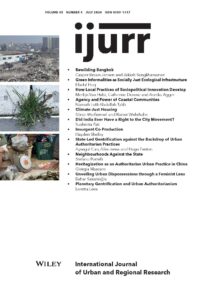This article addresses a critical gap in extant theorizing of urban transformations by focusing on the political and temporal dimensions of how innovations emerge, develop and become institutionalized into alternative systems of the everyday such as social centres, community gardens or urban commons. Going beyond current approaches, we offer a new understanding of innovations as sociopolitical practices: sets of resourced activities aiming to reshape urban spaces to achieve social and political ends locally. Developing an original theorization of such practices, we identify and differentiate between three sets of activities designed to meet local needs: assembling innovations—identifying and employing a wide variety of local resources within a neighbourhood; extending innovations—broadening the scope of initiatives and making them last; and, institutionalizing innovations, anchoring them in a more formalized structure. Sociopolitical innovations require sustained practices whereby situated agents pragmatically push for change over time. While the ongoing development of systems of the everyday may have limited immediate transformative impact, the reshaping of local resources prefigures an alternative which breaks from, yet is embedded in, everyday urban life. Our theorizing is underpinned by an international qualitative study of neighbourhoods in four European cities: Amsterdam, Birmingham, Copenhagen and Glasgow.
Details
Written by:
Merlijn Van Hulst, Catherine Durose, Annika Agger
Digital Object Identifier (DOI)
https://doi.org/10.1111/1468-2427.13246
About DOI

